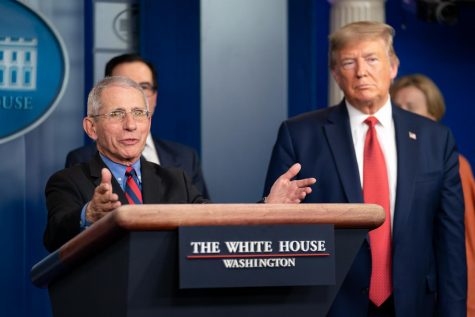Taking Stock on ISIS and the Death of Baghdadi
Abu Bakr al-Baghdadi, the leader of the Islamic state of Iraq and Syria, was killed by U.S. special forces. (Courtesy of Flickr)
November 6, 2019
When President Trump announced the death of ISIS leader Abu Bakr al-Baghdadi, history was made. As a result, America has come one step closer to liberating Syria from the tenacious clutches of terrorism that have been plaguing the region for years. However, it would be a fatal mistake to believe that terrorism is suddenly minimized following the death of just one major cog in the machine that is terrorism.
Baghdadi was an elusive force that drove ISIS and its radical ideals to prominence: These ideals threatened not only Syria, but the very fabric of America and the safety of its people. As a result, American troops made it their mission to capture Baghdadi for years in an attempt to suppress ISIS from further spreading throughout the world.
In 2019, as a result from a tip from an arrest, justice was served to Baghdadi. It is no secret that relations between the U.S. and Turkey have been tumultuous following the president’s controversial decision to withdraw American support from Syria, leaving our Kurdish allies to fight a war alone. Following this polarizing decision, it appears as if Trump is touting the achievement of killing Baghdadi as a trophy of success for America. However, this simply is not true.
By no means is the death of one man enough for ISIS, and other terrorist organizations for that matter, to begin to wave a submissive white flag. If America has learned anything from 9/11, terrorism in the Middle East is like a hydra. This is in part due to an extremist perversion of Islam which advocates the use of violent tactics.
As a result of extremist indoctrination, the seeds of terrorism that have come to define the Taliban, Al-Qaeda and most recently ISIS have been sewn into what will become the next generation of ISIS fighters. The process is cyclical, since new recruits can eventually become figures like Baghdadi.
Therefore once the wheels of terrorism begin to turn it is unknown if they can truly stop. Knowing that this cycle will only repeat, the U.S. would be in a state of delirium to believe that our mission in Syria is over.
The death of Baghdadi should not be treated as a green light for America to drive through oblivious to the fact that war will still rage in the Middle East. Instead, America needs to view Baghdadi’s death as a substantial move in the chess game that is counter-terrorism, which we have been playing for years. In simplest terms, Baghdadi’s death should provide more of an incentive for the U.S. to stay in Syria. This is due to two fundamental reasons. Firstly, the U.S. has irrefutably angered ISIS by killing its leader who has aided in its meteoric rise.
However, by no means does this equate to a meteoric fall for the terrorist organization because of the concrete platform Baghdadi has built for the terrorist group. Because there are so many people who have and still are actively subscribing to ISIS ideals, this makes it all the more difficult to put ISIS away for good, let alone terminate the entire terrorist threat against America and Syria altogether.
In fact, we have seen this before: When former President Obama announced the death of Osama Bin-Laden, former leader of Al-Qaeda, back in 2011. Although Bin Laden was killed, Al-Qaeda still will not be eviscerated. The same very much applies to ISIS: Where one falls, another will take the reigns of terror.
With this knowledge, U.S. troops should feel more obligation than ever before to remain in Syria to assess the potential new threats that may arise. Making this decision may not end the bloody war being fought in the Middle East, but it could be the next step in obtaining safety in America, and peace and diplomacy for Syria.
Noah Osborne, FCRH ’23, is a journalism major from Harlem, N.Y.












If you want a picture to show with your comment, go get a gravatar.